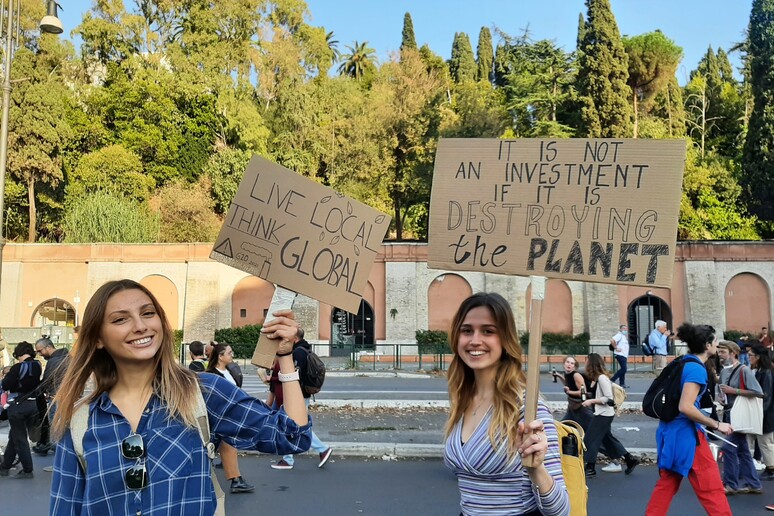(By Paul Virgo)
From the outside, the young people who
take part in marches demanding climate action look full of
humour, colour and cheer.
They sing, they laugh, they chant, they dance and they bang
drums.
They make jokes. "The planet is getting hotter than my imaginary
girlfriend," read a banner at a recent demo.
But with the prospect of an environmental catastrophe hanging
over their futures, when you speak to them one-on-one, many
admit to suffering stress, anxiety and even depression in
private.
A recent global study led by Bath University in Britain reported
that nearly 60% of young people were worried or extremely
worried about the climate crisis and close to half of
16-to-25-year-olds said it was affecting their everyday lives.
Getting involved in activism can help dispel the despair.
"I started ecological activism this summer because I started
having eco-anxiety," Pascal, a young man from northern France,
told ANSA during the Fridays For Future march in Rome on
Saturday.
"I stand for non-violent action to invite or strongly invite our
representatives and administrators to take more action, lead and
choose laws that allow us to transition towards a more
respectful economy and a more just system since the crisis we
are facing is going to increase the discrepancy between higher
and lower classes.
"There is a fight for biodiversity, but there is also the
dimension of social justice in this fight".
Chiara d'Avella, a Rome high-school student, said the stress was
compounded by the sensation that young people's demands were not
being listened to.
"As Italian students, we are asking for the voices of young
people, of students, to be heard by the government, by those who
are taking decisions for our future without listening to the
people who will actually live that future," d'Avella told ANSA
at Saturday's march demanding action at last weekend's G20
summit and at the ongoing COP26 UN Climate Conference in
Glasgow.
"We are asking for improvements in our education, in our
schools, our environment.
"We are the generation that is going to experience the
consequences of global warming and nobody is taking action to
address it.
"We will also live in a future with a totally precarious work
situation.
"Health is also a huge problem that we are asking the government
to face, not just ordinary health, but also mental health, which
is totally affecting our generation".
Another common feature of the young people campaigning for
climate action is that they have thought deeply about the
problem.
Most of the ones that this reporter spoke to have come to the
same conclusion - that we cannot solve the climate crisis unless
we tackle deeper issues of social justice.
While around 75% of greenhouse gases are produced by G20 States,
people in poorer countries are being hit first and worst even
though they are largely blameless.
For example, tens of thousands of lives are currently at risk in
southern Madagascar, one of the potentially many places in the
world where famine-like conditions have been driven by climate
change, according to the World Food Programme (WFP).
It is not just a question of rich countries against less
developed ones.
The effects of the climate crisis are being felt in the
developed world too, of course, but the consequences hit the
poorest and the most vulnerable hardest.
The elderly and migrant farm workers, for example, were among
the groups worst affected by the heat waves that Italy endured
in the summer, with degrees reaching a European record high of
48.8 degrees Celsius in Sicily.
According to a report by Oxfam and the Stockholm Environment
Institute, the wealthiest 1% of the global population were
responsible for the emission of more than twice as much carbon
dioxide as the poorest 50% of the world between 1990 and 2015.
So simply recycling more and phasing out fossil fuels will not
solve the climate crisis, they say.
Indeed, the mottos used at Fridays For Future protests include
'Uproot the System' and 'System Change not Climate Change'.
"We have some big things at stake and we still have a window of
action," Beatrice, a 26-year-old trainee lawyer, told ANSA.
"I do not find any purpose or joy in living in a capitalistic
economic model.
"It doesn't benefit anyone really, so why not change?
"It would be better for the people, the planet, the animals".
Beatrice, like Pascal, is a member of Extinction Rebellion, a
group that stages peaceful, but frequently disruptive protests,
to highlight the gravity of the climate crisis.
Their tactics are controversial and often unpopular.
But the aim is not popularity. It is to trigger action.
On the other hand, Glauko Barbagallo, a young Milan-based actor,
recently joined the Climate Reality Project, the international
network of volunteer activists founded by former United States
Vice-President and Nobel Peace Prize-winner Al Gore.
Climate Reality's activities include giving presentations and
social-media campaigns to raise awareness about the climate
crisis.
"In recent years I have seen the decline of the Staffora River
in Salice Terme near Pavia due to the rise in temperatures,"
Barbagallo said in a video appeal calling for COP26 to deliver
as part of Climate Reality's global day of action on Friday .
"I'd like to appeal to our leaders meeting at COP26 in Glasgow
to take real action to stop climate change. Let's get real!".
ALL RIGHTS RESERVED © Copyright ANSA











